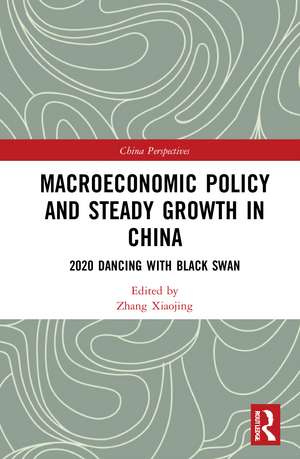Macroeconomic Policy and Steady Growth in China: 2020 Dancing with Black Swan: China Perspectives
Editat de Zhang Xiaojingen Limba Engleză Paperback – 31 mai 2023
Based on a balance sheet approach and macro-financial linkage analysis, this book carries out a comprehensive analysis of the trends within China’s macroeconomy in 2020. The author argues that the COVID-19 pandemic created a great degree of uncertainty—therefore, supply-side structural reform and improved total factor productivity have been promoted to ensure a policy of steady growth. Given the declining economic growth rate in percentage terms, China has needed to adapt to a moderate increase in the leverage ratio while applying more effective fiscal policies to achieve a dynamic balance between stable growth and risk prevention.
Scholars and students of economics and finance, especially Chinese economics, will find this book a useful reference.
| Toate formatele și edițiile | Preț | Express |
|---|---|---|
| Paperback (1) | 369.73 lei 6-8 săpt. | |
| Taylor & Francis – 31 mai 2023 | 369.73 lei 6-8 săpt. | |
| Hardback (1) | 1113.28 lei 6-8 săpt. | |
| Taylor & Francis – 20 sep 2021 | 1113.28 lei 6-8 săpt. |
Din seria China Perspectives
-
 Preț: 310.96 lei
Preț: 310.96 lei -
 Preț: 310.08 lei
Preț: 310.08 lei -
 Preț: 309.99 lei
Preț: 309.99 lei -
 Preț: 303.38 lei
Preț: 303.38 lei -
 Preț: 313.81 lei
Preț: 313.81 lei -
 Preț: 309.99 lei
Preț: 309.99 lei -
 Preț: 353.07 lei
Preț: 353.07 lei -
 Preț: 310.22 lei
Preț: 310.22 lei -
 Preț: 326.49 lei
Preț: 326.49 lei - 9%
 Preț: 935.31 lei
Preț: 935.31 lei - 9%
 Preț: 935.09 lei
Preț: 935.09 lei -
 Preț: 287.20 lei
Preț: 287.20 lei -
 Preț: 310.43 lei
Preț: 310.43 lei -
 Preț: 280.65 lei
Preț: 280.65 lei -
 Preț: 289.75 lei
Preț: 289.75 lei -
 Preț: 301.83 lei
Preț: 301.83 lei -
 Preț: 310.65 lei
Preț: 310.65 lei -
 Preț: 487.65 lei
Preț: 487.65 lei -
 Preț: 308.53 lei
Preț: 308.53 lei -
 Preț: 481.88 lei
Preț: 481.88 lei - 9%
 Preț: 1104.87 lei
Preț: 1104.87 lei - 9%
 Preț: 934.17 lei
Preț: 934.17 lei - 9%
 Preț: 934.70 lei
Preț: 934.70 lei - 28%
 Preț: 987.72 lei
Preț: 987.72 lei - 30%
 Preț: 930.81 lei
Preț: 930.81 lei - 26%
 Preț: 624.60 lei
Preț: 624.60 lei - 30%
 Preț: 850.95 lei
Preț: 850.95 lei - 18%
 Preț: 1109.18 lei
Preț: 1109.18 lei - 30%
 Preț: 932.02 lei
Preț: 932.02 lei - 18%
 Preț: 1109.36 lei
Preț: 1109.36 lei - 26%
 Preț: 875.55 lei
Preț: 875.55 lei - 48%
 Preț: 628.10 lei
Preț: 628.10 lei - 18%
 Preț: 1109.18 lei
Preț: 1109.18 lei - 30%
 Preț: 875.55 lei
Preț: 875.55 lei - 18%
 Preț: 784.00 lei
Preț: 784.00 lei - 30%
 Preț: 1013.10 lei
Preț: 1013.10 lei - 18%
 Preț: 892.16 lei
Preț: 892.16 lei - 30%
 Preț: 875.55 lei
Preț: 875.55 lei - 28%
 Preț: 986.91 lei
Preț: 986.91 lei - 26%
 Preț: 929.97 lei
Preț: 929.97 lei - 18%
 Preț: 1109.18 lei
Preț: 1109.18 lei - 18%
 Preț: 780.87 lei
Preț: 780.87 lei - 15%
 Preț: 453.68 lei
Preț: 453.68 lei - 28%
 Preț: 875.55 lei
Preț: 875.55 lei - 18%
 Preț: 1109.18 lei
Preț: 1109.18 lei - 18%
 Preț: 1218.26 lei
Preț: 1218.26 lei - 26%
 Preț: 1186.64 lei
Preț: 1186.64 lei
Preț: 369.73 lei
Nou
Puncte Express: 555
Preț estimativ în valută:
70.75€ • 75.65$ • 58.99£
70.75€ • 75.65$ • 58.99£
Carte tipărită la comandă
Livrare economică 18 aprilie-02 mai
Preluare comenzi: 021 569.72.76
Specificații
ISBN-13: 9781032033389
ISBN-10: 103203338X
Pagini: 318
Ilustrații: 25 Tables, black and white; 122 Line drawings, black and white; 122 Illustrations, black and white
Dimensiuni: 156 x 234 x 17 mm
Greutate: 0.45 kg
Ediția:1
Editura: Taylor & Francis
Colecția Routledge
Seria China Perspectives
Locul publicării:Oxford, United Kingdom
ISBN-10: 103203338X
Pagini: 318
Ilustrații: 25 Tables, black and white; 122 Line drawings, black and white; 122 Illustrations, black and white
Dimensiuni: 156 x 234 x 17 mm
Greutate: 0.45 kg
Ediția:1
Editura: Taylor & Francis
Colecția Routledge
Seria China Perspectives
Locul publicării:Oxford, United Kingdom
Public țintă
Postgraduate, Undergraduate Advanced, and Undergraduate CoreCuprins
Preface. Part I Introduction. 1. Dancing with the black swan: the balance between economic growth and risk in a new paradigm (Zhang Xiaojing). Part II Stabilizing Growth. 2. The analysis and prospects of consumption (Li Cheng). 3. The analysis and prospects of investment in fixed assets (Liu Xueliang). 4. The analysis and prospects of international trade (Zhang Ying). Part III Stabilizing Leverage. 5. Analysis of the household leverage ratio (Zhang Xiaojing, Chang Xin and Liu Lei). 6. The analysis of the corporate leverage ratio (Zhang Xiaojing, Chang Xin and Liu Lei). 7. The analysis of government leverage ratio (Zhang Xiaojing, Chang Xin and Liu Lei). 8. The analysis of financial leverage ratio (Zhang Xiaojing, Chang Xin and Liu Lei). 9. The estimation of local governments’ hidden debt and its risks (Liu Lei). Part IV Stabilization Policy. 10. Analysis and outlook for fiscal policy (Liu Lei). 11. Analysis and outlook for monetary policy (Chen Hanpeng). 12. The global economic predicament and the transformation of China’s macroeconomic policy (Tang Duoduo). Afterword.
Notă biografică
Zhang Xiaojing is a professor of economics and director of Institute of Finance & Banking (IFB), Chinese Academy of Social Sciences (CASS); director of National Institution for Finance & Development (NIFD); and a member of Chinese Economists 50 Forum. His research interests are open economy macroeconomics, macro finance, and development economics.
Wang Pinda is a graduate of Peking University. His research interests include labor economics and macroeconomics. He has translated books about macroeconomic policies of China.
Wang Pinda is a graduate of Peking University. His research interests include labor economics and macroeconomics. He has translated books about macroeconomic policies of China.
Descriere
This book applies a new theoretical framework based on a balance sheet approach and macro-financial linkage analysis to analyse macroeconomic trends in China for 2020. Uncertainties brought about by Covid19 have necessitated a policy of steady growth.




















